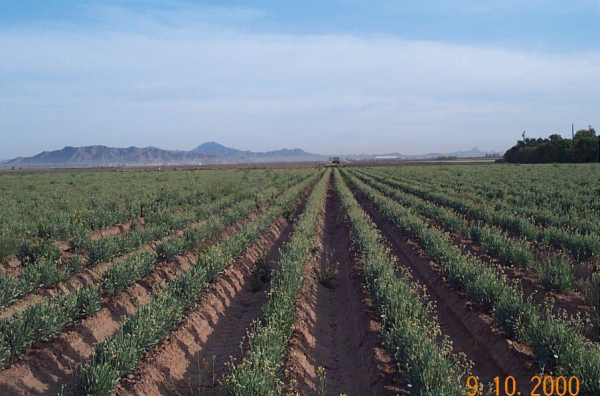Arizona Agriculture is an Engine of Innovation!
Published
4/29/2014
By Julie Murphree, Arizona Farm Bureau: New USDA Discoveries Led to 180 New Inventions that include Flour that Prevents Weight Gain, Protections from Disease for U.S. Troops, Turning Grass Clippings to Energy. Here in Arizona, a local company earned 8 new patents from the USDA.
While Agriculture Secretary Tom Vilsack was recently announcing a new report on scientific breakthroughs discovered by USDA researchers that led to new patents and inventions with the potential for commercial application and potential economic growth, here at home a private company was announcing eight new Plant Variety Patents, certifying the company has invented and reproduced eight new strains of the guayule shrub, an emerging Arizona agriculture crop.
Casa Grande, Arizona-based company PanAridus had reported that the United States Department of Agriculture Plant Variety Protection Office had officially granted the patents. Guayule, a native Sonoran Desert plant, has been viewed as a promising natural rubber alternative to the Hevea (rubber) tree because they yield almost identical polymers, which can be utilized for tires, tubes, medical devices and gloves among other products; however, the industry has struggled for decades trying to unlock the genetic secrets to producing higher and annual yields to make it profitable for farmers to grow and offset the demand-induced global shortfall by the end of the decade. The U.S. government and domestic tire companies have been particularly interested in guayule as the nation must now import 100% of its supply of natural rubber from tropical regions where the Hevea tree grows, with tire companies consuming between 60-65 percent of all imports.

A Guayule field located in Arizona.
In some ways, considering the wide array of crops and livestock in Arizona agriculture, it’s no surprise to hear about such innovations in the agriculture industry and specifically in Arizona agriculture.
Regarding the study announcement by Vilsack, innovations included in the report range from flour made out of chardonnay grape seeds that prevents weight gain to antimicrobial packets that keep food from spoiling, efforts to protect U.S. troops in Iraq from diseases carried by sand flies, new processes for turning grass clippings and raked leaves into bioenergy, and many more. For Arizona and the Guayule plant, it’s about transforming the rubber industry.
“Studies have shown that every dollar invested in agricultural research returns $20 to the economy. We have accelerated commercialization of federal research and government researchers are working closely with the private sector to develop new technology and transfer it to the marketplace,” said Secretary Vilsack. “USDA has a proven track record of performing research that benefits the public.”
Discoveries from USDA's 2013 Technology Transfer Report include:
- A new kind of flour made from chardonnay grape seeds that can prevent increases in cholesterol and weight-gain (the Mayo Clinic is currently conducting human clinical trials on the product);
- New ways to turn lawn clippings and tree leaves from cities into bioenergy;
- An enzyme compound that can be used to develop insecticides to combat sand flies, a disease spreading insect that poses a major problem for U.S. military in Iraq and is responsible for hundreds of thousands of childhood deaths in Africa;
- A computer-based model of the fluid milk process to lower greenhouse gas emissions (the model has been distributed to more than 100 processors in the United States and should help the dairy industry realize its goal of reducing greenhouse gas emissions by 25 percent per gallon of milk by 2020);
- Oat concentrates, a digestible, functional food from oats licensed for the production of Calorie-Trim and Nutrim;
- A new process for turning old tires into zinc fertilizer;
- A handheld device that uses gold nanoparticles to detect West Nile virus (and potentially other diseases) in blood samples;
- Window cleaners that use a biodegradable solution of nanoparticles that prevent water-beading that are superior to current cleaners;
- A small packet that when inserted in small fruit containers releases an antimicrobial vapor that helps keep fresh fruit from rotting on the shelf.
USDA reports receiving 51 patents, filing 147 patent applications, and disclosing 180 new inventions in the last fiscal year, which are detailed in the Department's 2013 Annual Report on Technology Transfer released today. Helping drive these innovations, USDA has 259 active Cooperative Research and Development Agreements with outside investigators, which includes Universities and other organizations, including 117 with small businesses. The USDA's technology transfer program is administered by the Agricultural Research Service (ARS), USDA's principal intramural scientific research agency.
Of all the agriculture patents issued by the USDA, PanAridus’ eight
PanAridus CEO, Mike Fraley, called the eight new patents part of the company’s continuing commitment to
Over the years, USDA innovations have created all sorts of products Americans use every day, from
- Frozen orange juice concentrate;
- "Permanent press" cotton clothing;
- Mass production of penicillin
in World War II; - Almost all breeds of blueberries and cranberries currently in production, and 80% of all varieties of citrus fruits grown in the U.S.;
- "Tifsport", a turf used on NFL, collegiate, and other sports fields across the country, specifically designed to withstand the stress and demands of major team sports. Tifsport is also used on PGA and other golf course fairways, while its sister turf, "Tifeagle", specially designed to be mowed to one-tenth of an inch daily, is used
on PGA putting greens.
The 2014 Farm Bill will help to build on these accomplishments by establishing a new Foundation for Food and Agriculture Research that leverages $200 million in public funding and another $200 million from the private sector to support groundbreaking agricultural research.
So, on to more innovation in agriculture! As we say at Arizona Farm Bureau, “Agriculture makes things!” Maybe we should add, "Agriculture makes things happen!"
Join our Family!